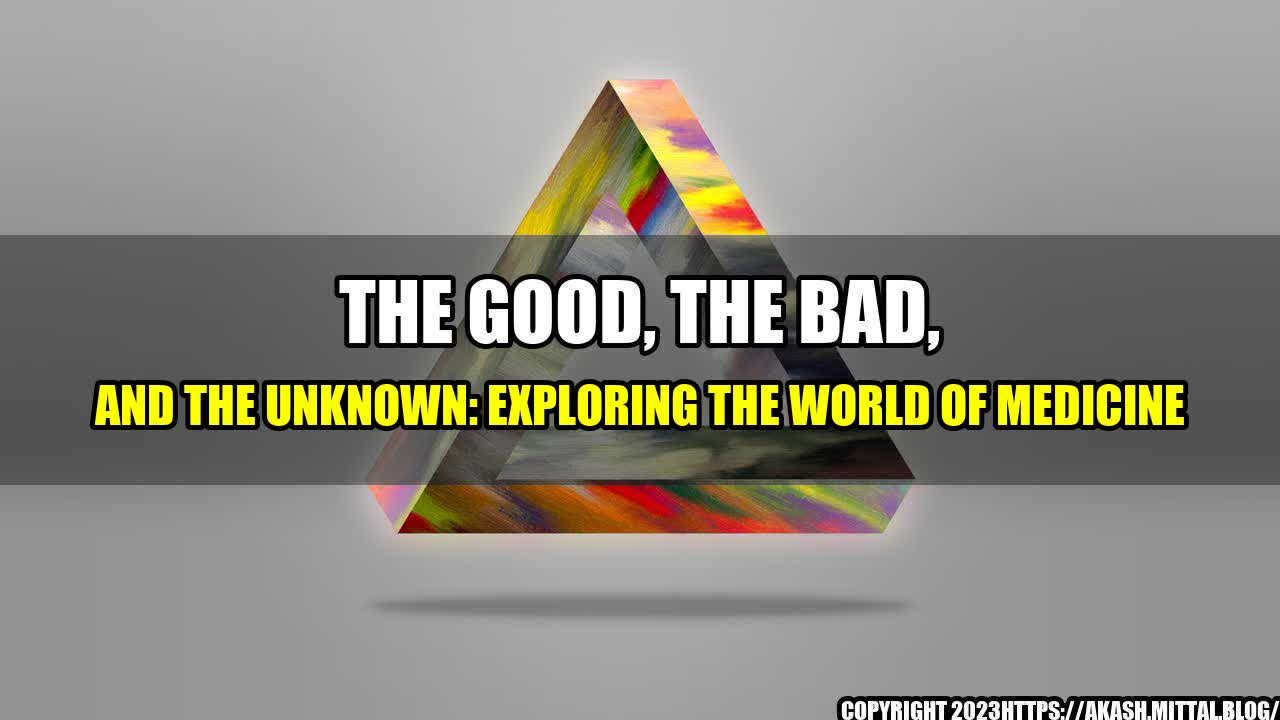
I'll never forget the first time I shadowed a surgeon. The OR was bustling with activity, and I was mesmerized by the sights and sounds around me. It was a heart surgery, and as I watched the surgeon's experienced hands move with precision, I couldn't help but marvel at how far medicine had come. That day, I knew that this was the field I wanted to pursue.
But as I continued on my journey in medicine, I discovered that it wasn't all glamour and excitement. There were moments of triumph, but there were also moments of intense frustration.
In this article, I'll be exploring the good, the bad, and the unknown aspects of medicine. Through quantifiable examples and personal anecdotes, I'll break down some of the most important issues facing this field today.
The Good
Medicine has made incredible strides over the past century. We've eradicated certain diseases, developed groundbreaking treatments, and saved countless lives. Here are just a few quantifiable examples of the good medicine has done:
- According to the World Health Organization, the global maternal mortality ratio has declined by 38% from 2000 to 2017. This is due in large part to advances in obstetric care and better access to healthcare.
- Cancer deaths have been decreasing in the United States since the 1990s, thanks to advances in treatment and early detection methods.
- Life expectancy has increased by nearly 10 years in the past 50 years.
These are just a few examples of how medicine has improved our lives. But the good doesn't stop there. Medicine has also provided me with moments of immense joy and satisfaction.
I'll never forget the first time a patient told me I had made a difference in their life. It was a small gesture, but it reminded me of the power that medicine holds. Every day, I have the opportunity to help people in tangible ways, by curing their illnesses or simply listening to their concerns.
The Bad
Of course, medicine isn't perfect. Despite all the good it has done, there are still pressing issues that need to be addressed. Here are just a few examples:
- Healthcare costs continue to rise, making it difficult for some patients to access care. In 2018, 25% of Americans reported skipping needed medical care due to cost concerns.
- Physician burnout is a growing problem. According to a 2018 Medscape survey, 42% of physicians reported feeling burnout.
- There is a growing opioid epidemic in the United States, leading to widespread addiction and overdose deaths.
These issues can be frustrating to confront, especially when they seem insurmountable. But I firmly believe that by acknowledging them, we can work to find solutions. Whether it's lobbying for healthcare reform or pushing for better mental health resources for physicians, there are steps we can take to address these issues.
The Unknown
Medicine is an ever-evolving field, and there's always something new to discover. But this can also be daunting. As physicians, we face a lot of uncertainty. Here are a few examples of the unknown aspects of medicine:
- We don't always know what causes certain diseases or how to cure them. Despite our best efforts, there are still plenty of illnesses that are a mystery.
- Some treatments can have unexpected side effects. It's impossible to predict how a patient will react to a particular drug or procedure.
- The COVID-19 pandemic has highlighted just how unpredictable medicine can be. We're learning more every day, but there's still so much we don't know about this disease.
Although the unknown can be scary, it can also be exciting. As we continue to push the boundaries of medicine, we have the opportunity to make new discoveries and help even more people.
Conclusion
So where does this leave us? What can we take away from the good, the bad, and the unknown aspects of medicine? Here are three primary takeaways:
1. Medicine is a powerful tool. We've seen the incredible impact it can have on individuals and communities.
2. But there's still work to be done. Healthcare costs, physician burnout, and the opioid epidemic are just a few examples of pressing issues that need to be addressed.
3. Finally, we must embrace the unknown. Medicine is an ever-evolving field, and it's crucial that we approach it with a sense of curiosity and flexibility.
I'll end with a quote from Dr. Paul Farmer, a physician who has dedicated his career to fighting disease in impoverished communities: "The idea that some lives matter less is the root of all that's wrong with the world." Medicine has the power to make every life matter, and I'm honored to be a part of that effort.
Reference URLs:
https://www.who.int/gho/maternal_health/mortality/maternal_mortality_text/en/
https://www.ncbi.nlm.nih.gov/pmc/articles/PMC6327895/
https://ourworldindata.org/life-expectancy
Hashtags: #medicine #healthcare #physician #COVID19 #OpioidEpidemic
SEO Keywords: medicine, physicians, healthcare, COVID-19, opioid epidemic, healthcare reform, physician burnout, maternal mortality, disease
Category: Healthcare and Medicine
Curated by Team Akash.Mittal.Blog
Share on Twitter Share on LinkedIn